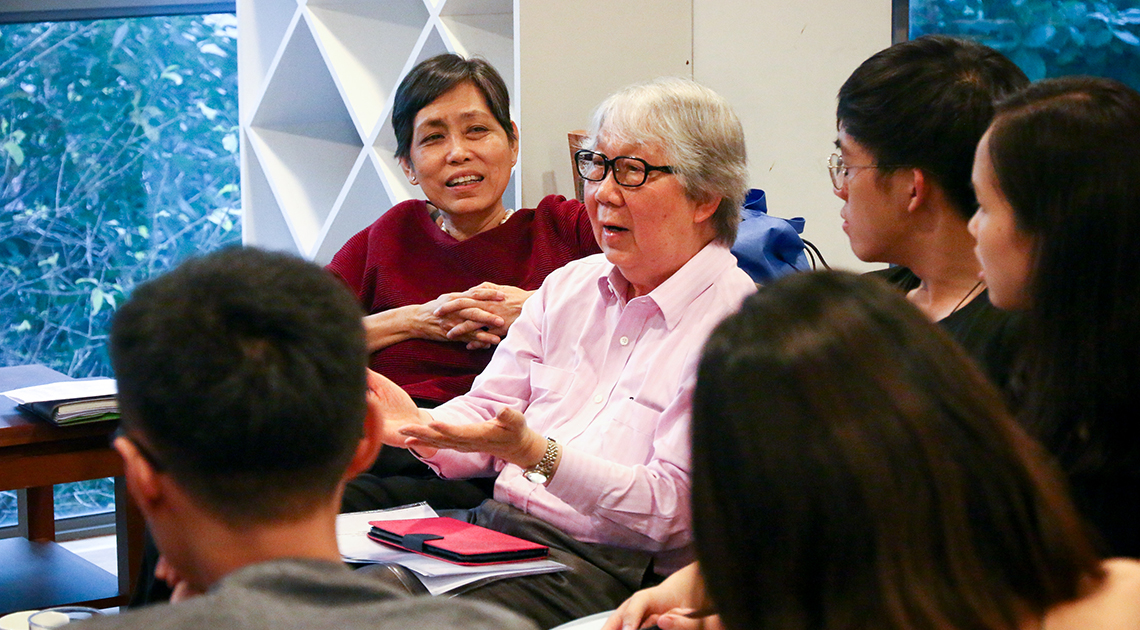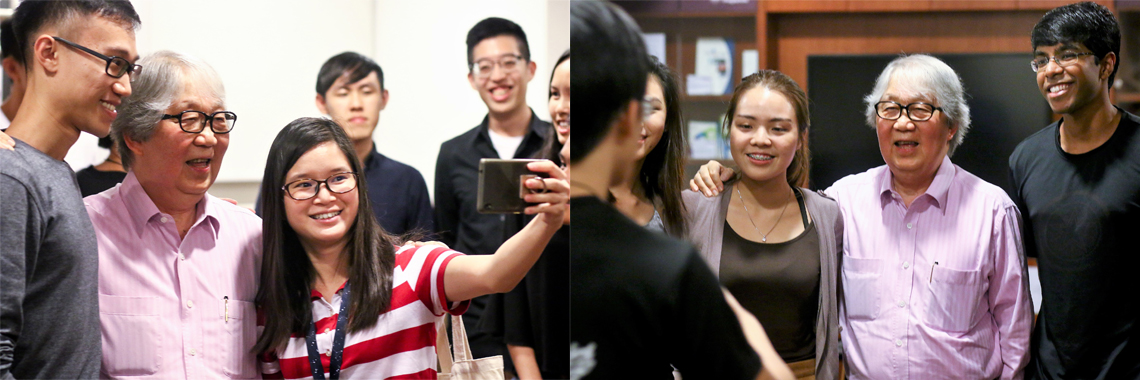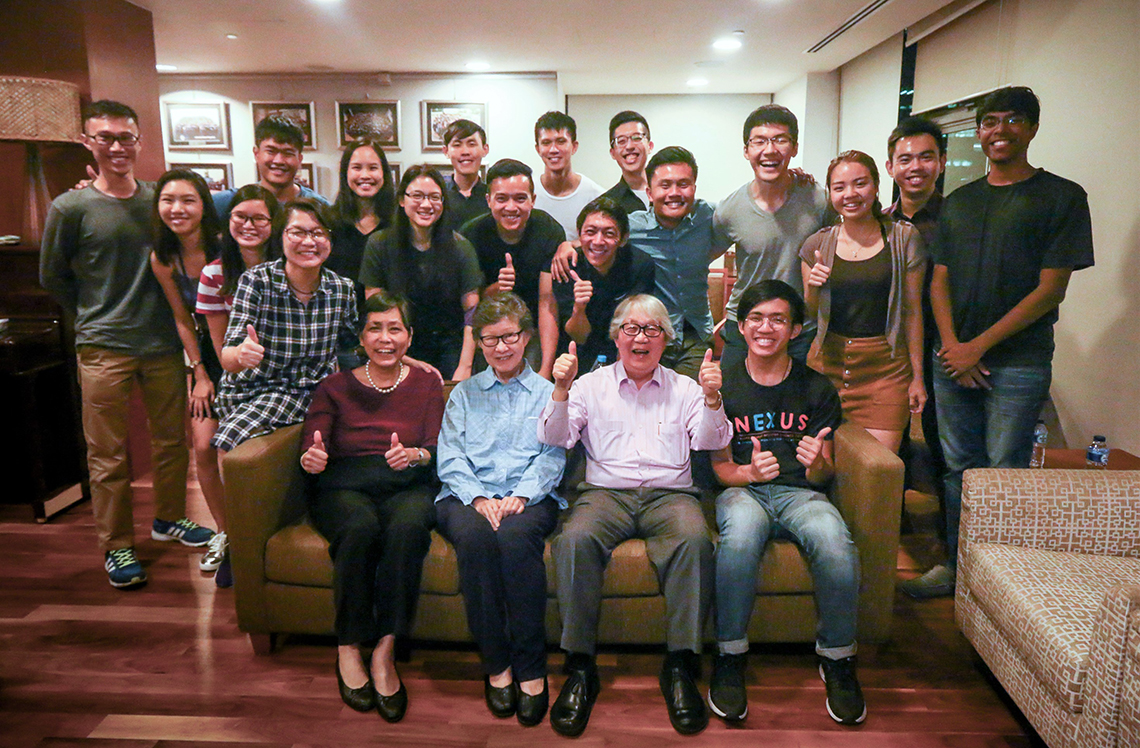Singapore, ASEAN and the World: Dinner and Dialogue with Professor Tommy Koh
By Cheah Wenjie (Law + USP, Class of 2019)
Wenjie is a student writer for USP Highlights.
Published: 13 April 2018

USP students and Rector Ms Euleen Goh (in red) listening intently to Professor Tommy Koh's (center) sharing.
The mood was set, the students were ready, and an air of excitement permeated the air. On 29 March 2018, USP students joined Professor Tommy Koh and his wife, Ms Poh Siew Aing for an intimate dinner and dialogue session at the Cinnamon College (USP) Master’s Commons for the latest iteration of The Rector's Programme.
The session began over dinner with food served from the College Dining Hall. Students had the opportunity to engage Professor Koh and Ms Poh on light-hearted issues, and many personal anecdotes were shared, such as on Professor Koh’s diet (no carbohydrates), and their two young grandchildren. Ms Poh candidly shared that Professor Koh was a favourite amongst their grandchildren, while Professor Koh displayed his affable charm chatting about his busy schedule in between bites.
Professor Tommy Koh, himself a distinguished alumnus of National University of Singapore, wears many hats. He is Ambassador-at-Large at Singapore’s Ministry of Foreign Affairs, Chairman of the Centre for International Law of NUS, and Special Advisor of the Institute of Policy Studies. He was previously Chairman at National Heritage Board, and also played significant roles in ASEAN relations. With this broad portfolio of experiences, students were excited and grateful to be able to pick his brain on various issues.
The dialogue started with a focus on Singapore. USP student Ow Yong Zhi Qi (History + USP, Class of 2020) posed a question on upcoming laws that would prohibit the public from filming during national security threats, and their implications on free speech. In response, Professor Koh cited the usefulness of such laws in preventing terrorists from being able to use social media to monitor a threat situation and anticipate police tactics. Such laws may be necessary for effective police work, he said.
Since the issue of free speech was raised, the conversation quickly shifted to discussing deliberate online falsehoods, a hot-button topic given the recent public hearings by the Select Committee on Deliberate Online Falsehoods. Here, Professor Koh thought not all fake news should be banned, and that the Select Committee was not aiming to do so. Instead, he noted a consensus seems to be emerging that a narrowly-defined law targeted at falsehoods related to national security or racial-religious issues would be desirable.
Professor Koh continued to share anecdotes of his various experiences over the course of his illustrious career. He spoke of his work when he chaired the Censorship Review Committee. Referring to the 1992 report the committee released, he shared that back then, he had been willing to loosen up on censorship. A specific example was the decision to remove or retain the R-21 age restriction on films. “If you’re old enough to die for your country” he mused, “surely you’re old enough to watch a movie.” The loosening of this was however abandoned, mostly as a result of a Gallup poll the committee had commissioned. The poll revealed that most Singaporeans were still highly conservative and favour retaining the R-21 (then known as R(A)) age restriction.
As a famed negotiator, Professor Koh has worked with, and advised various civil groups on resolving tricky issues. He spoke about the good work of the Inter-Religious Organisation (IRO) Singapore, a non-governmental organisation which promotes inter-faith dialogues and religious harmony, and shared how members of the Baha’i faith had sought his help to convince IRO to include them as a represented faith.

USP students took the opportunity to snap photos with Professor Koh.
Of course, no conversation with Professor Koh is complete without a discussion on foreign affairs. Professor Koh talked about ASEAN, how it has served to keep peace in Southeast Asia, and contributed to maintaining stability in the larger Asia-Pacific region.
In response to a question posed on whether ASEAN’s response to the Rohingya crises in Myanmar was sufficient, Professor Koh said that ASEAN’s strict commitment to non-intervention in domestic affairs and steadfast requirement of unanimity in decision-making have their limitations. However, he noted that this ASEAN model has worked well for many years, and shared frankly on how the model is necessary to maintain consensus amongst Southeast Asian nations and for ASEAN to even continue to exist. Professor Koh, in his trademark congenial manner, offered his view that diplomats can and have to be creative and savvy in finding alternative ways to achieve their interests within the existing model.
Professor Koh also spoke about China—how its growing influence and power presented a challenge to US hegemony, and suggestion by some academics that such challenges, throughout history, have led to war more times than not. He said that the two nations have tried to forestall conflict through tighter economic integration and diplomatic relations. Nonetheless, Professor Koh warned that such efforts may not always be enough. “Economic interdependence is not a guarantee of peace”, he said, “Politics will always trump economics.”
At the prompting of Ms Euleen Goh, the Rector of USP, for some parting lessons, Professor Koh happily closed the dialogue with this advice—it is important to have three kinds of intelligence. IQ, intellectual intelligence is important and something Singaporeans are good at. But EQ, emotional intelligence, as well as CQ, or cultural intelligence, are essential too.
“When we drafted the ASEAN charter, we had to give in on the wording in some areas”, Professor Koh shared, “it is alright to give in on some areas so long as there are no substantial implications on our interests.”
“After all, you can’t win everything. If you win everything in a negotiation, what’s the other guy going to tell his boss?”

USP students were thrilled to have Professor Tommy Koh at USP that Thursday evening.
Photos taken by USP student Tham Jun Han (Engineering Science + USP, Class of 2018)

